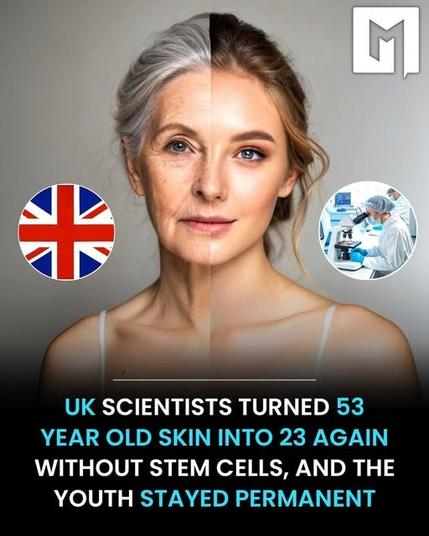UK Scientists Achieve Breakthrough in Reversing Skin Cell Aging by 30 Years
Researchers at the Babraham Institute in the UK have made a ground-breaking discovery, rejuvenating 53-year-old human skin cells to function as if they were 23 years old, while preserving their original identity.
Using a technique called partial cellular reprogramming, they applied a brief, controlled dose of Yamanaka factors—proteins that reset the genetic markers of aging—over just 13 days.
Unlike full reprogramming, which turns cells into stem cells and erases their specialized roles, this method kept the cells’ skin-specific functions intact.
The revitalized cells exhibited remarkable changes: faster wound healing, increased collagen production, and activation of youthful gene patterns.
Visually, they appeared younger under a microscope, with improved structure, stronger connections, and enhanced resilience.
Notably, these rejuvenated traits persisted weeks after the treatment, indicating a deep, lasting reset of the cells’ biological age.
This advancement holds transformative potential for regenerative medicine, with applications for aging skin, arthritis, and possibly neurodegenerative diseases like Alzheimer’s.
The discovery paves the way for therapies that don’t just mask aging but fundamentally reverse it at the cellular level.
Core Topic – Skin & Aging
#SkinAging #AgeReversal #CellRejuvenation #HealthyAging #Longevity #YouthfulSkin #SkinScience #AgeDefying #RegenerativeSkin
Research & Discovery
#ScienceNews #MedicalBreakthrough #CuttingEdgeScience #FutureOfMedicine #ResearchMatters #ScientificDiscovery #LifeSciences #BiomedicalResearch
Techniques & Biology
#CellularReprogramming #PartialReprogramming #YamanakaFactors #Epigenetics #StemCellResearch #CellTherapy #MolecularBiology #GeneticReprogramming
Regenerative & Anti-Aging Medicine
#RegenerativeMedicine #AntiAging #LongevityScience #NextGenMedicine #AgeReversalTherapy #HealthyLongevity #MedicalInnovation
